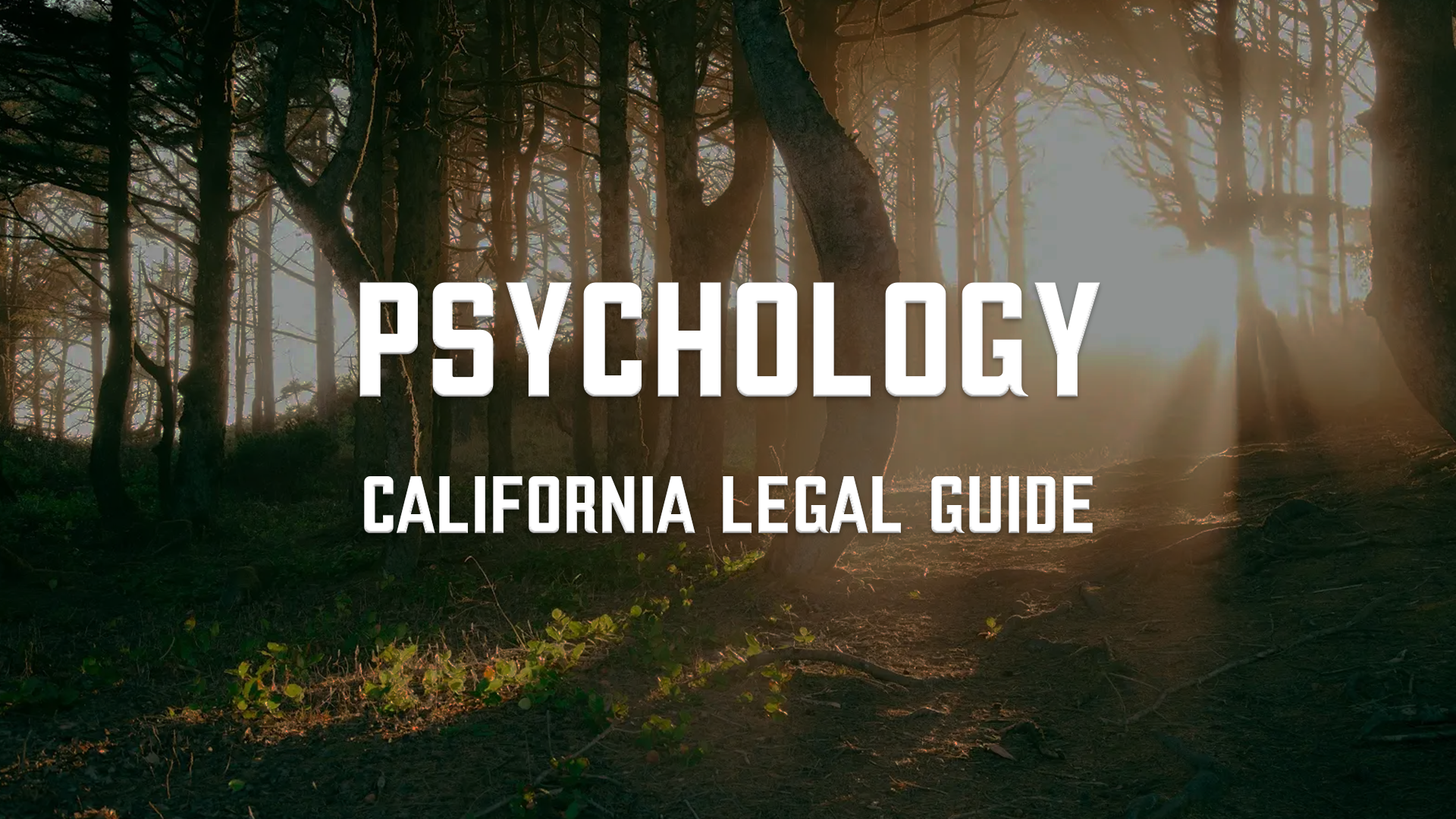California psychology laws and licensing Regulations: Complete guide (2025)
Find essential information on California Board of Psychology laws and regulations, including FAQs, professional conduct standards, licensing, and disciplinary actions.
If you’re looking for clear answers about the laws and rules that apply to psychologists in California, you’re in the right place. With nearly 1,000 pages to sort through in the California Board of Psychology's Laws and Regulations Book, finding what you need can be a challenge. This page is designed to make it easier.

We’ve organized our guide CA psychology laws and regulations into three sections:
- Overview: A quick look at the key topics you need to know, followed by a streamlined table of contents.
- FAQs: Common questions about licensing, professional conduct, reporting, disciplinary action, and more—with direct page references to the official 2025 regulations.
- Annotated table of contents for all laws and regulations: A detailed guide to every section in the California Board of Psychology's Laws and Regulations Book.
You can download the full regulations at any time using the links on this page. This resource is here to help you find accurate, up-to-date information directly from official sources.
Please note: This guide is intended to help you find accurate, up-to-date legal information directly from official sources on mental health in California. Our guide does not serve as legal advice or regulatory interpretation, but rather as a tool to support your understanding of California’s legal framework for psychologists.
Overview of California Psychology Laws and Regulations
Understanding the complex laws that govern the practice of psychology in California is essential for current and aspiring licensed professionals. The California Board of Psychology Laws and Regulations spans nearly 1,000 pages and includes legal guidance from multiple state codes, including the Business and Professions Code, Civil Code, Evidence Code, and many more.

This guide is designed to help you navigate these regulations efficiently. In this section, we provide a high-level overview of the most important areas covered by California law as it relates to psychology, including:
- Licensing Requirements: Find out what’s needed to apply for a license, including educational prerequisites, supervised experience, and examination details.
- Professional Conduct & Ethics: Learn about unprofessional conduct, recordkeeping standards, confidentiality requirements, and continuing education obligations.
- Disciplinary Actions: Understand how the Board handles complaints, investigations, license suspensions, revocations, and administrative hearings.
- Confidentiality & Privilege: Review the legal rules for psychotherapist-patient privilege, medical information disclosure, and client privacy protections.
- Special Populations & Scenarios: Discover regulations that apply to working with minors, individuals with mental illness, and mandated reporting responsibilities for abuse or neglect.
- Unlicensed Practice & Enforcement: Learn how California enforces its licensing laws and what activities are strictly reserved for licensed psychologists.
- Psychological Corporations & Technicians: Explore requirements for forming professional corporations and the regulations that govern psychological testing technicians.
Abbreviated Table of Contents
This overview highlights core sections from the Business and Professions Code, California Code of Regulations, and other essential codes that cover licensing, confidentiality, child custody, mental health, and criminal reporting obligations for psychologists. Use this guide to identify the primary areas covered in the regulations and jump straight to the sections most relevant to your needs.
BUSINESS AND PROFESSIONS CODE (Pages 1 – 162)
The Business & Professions Code encompasses foundational provisions for licensing psychologists in California, covering consumer protection, unlicensed activity enforcement, license denial and revocation, and professional conduct standards.
CALIFORNIA CODE OF REGULATIONS (Pages 165 – 212)
Outlines education, licensing procedures, professional conduct standards, disciplinary actions, and fee requirements for psychologists.
CIVIL CODE (Pages 226 – 242)
Regulations for confidentiality of medical information, specifying disclosure rules and patient rights in healthcare settings.
CORPORATIONS CODE (Page 243)
Guidelines for healthcare-related professional corporations, detailing ownership, management, and compliance standards for psychologists.
EDUCATION CODE (Pages 257 – 262)
Requirements for private postsecondary institutions offering psychology programs, ensuring standards for educational quality and consumer protection.
EVIDENCE CODE (Pages 263 – 269)
Defines psychotherapist-patient confidentiality, including scope, limitations, and exceptions for information in legal contexts.
FAMILY CODE (Pages 271 – 273)
Guidelines for child custody, visitation rights, and minors' medical consent, particularly for mental health services.
GOVERNMENT CODE (Pages 283 – 310)
Regulations on public officers, state agency operations, administrative processes, and anti-discrimination measures in California.
HEALTH AND SAFETY CODE (Pages 313 – 599)
Comprehensive regulations on public health, healthcare facility licensing, mental health services, patient rights, and controlled substance policies.
LABOR CODE (Page 603)
Workers’ compensation provisions for healthcare employees, detailing legal protections and benefits for workplace injuries or illnesses.
PENAL CODE (Pages 605 – 655)
Criminal laws related to public health, safety, and mandatory reporting requirements for psychologists in cases of abuse and neglect.
WELFARE AND INSTITUTIONS CODE (Pages 699 – 803)
Regulations for mental health services for juveniles, elder abuse reporting, and Medi-Cal mental health services, focusing on protections for vulnerable populations.
CALIFORNIA RULES OF COURT (Pages 805 – 847)
Rules for family and juvenile court procedures, focusing on child custody evaluations, visitation rights, and child welfare standards.
The abbreviated table of contents above provides a streamlined map of the California Board of Psychology Laws and Regulations. Use it to quickly identify the most relevant parts of the law before diving deeper into our FAQs or exploring the full, annotated table of contents below.
FAQs About California Psychology Laws and Regulation
Below are commonly asked questions about psychology laws and regulations in California. These pertain to licensing, unprofessional conduct, continuing education requirements, and myriad more key topics. Alongside each question, you’ll find specific page numbers from the 2025 edition of the California Board of Psychology Laws and Regulations.
Once you know the section of the California Board of Psychology Laws and Regulations where you’ll find your answer, download the official document and navigate to the relevant pages.
- What are the general provisions for psychologists practicing in California?
- Refer to: Division 2, Chapter 6.6, Article 1. General Provisions, Page 113
- How do I apply for a psychology license in California?
- Refer to: Title 16, Article 2. Applications, Page 167
- What are the educational and experience requirements to become a licensed psychologist?
- Refer to: Title 16, Article 3. Education and Experience, Page 171
- What fees do I need to pay when applying for a psychology license?
- Refer to: Title 16, Article 6. Fees, Page 196
- How do I report a licensed psychologist for unethical behavior?
- Refer to: Division 2, Article 11. Professional Reporting, Page 89
- What happens if a psychologist is caught committing insurance fraud?
- Refer to: Division 2, Article 12. Insurance Fraud, Page 105
- What are the consequences for violating continuing education requirements?
- Refer to: Title 16, Article 10. Continuing Education, Page 212
- Can I practice psychology in California without a license?
- Refer to: Division 2, Chapter 1.5. Exemption from Licensure, Page 110
- What are the rights of a psychologist during a formal disciplinary hearing?
- Refer to: Government Code, Chapter 4.5. Administrative Adjudication: General Provisions, Page 302
- How are psychological testing technicians regulated in California?
- Refer to: Division 2, Article 10. Psychological Testing Technicians, Page 153
- What are the general responsibilities of the California Department of Consumer Affairs?
- Refer to: Chapter 1. The Department, Page 20
- What is the process for enforcing unlicensed activity in the field of psychology?
- Refer to: Chapter 1.5. Unlicensed Activity Enforcement, Page 40
- How are licenses denied, suspended, or revoked for psychologists?
- Refer to: Division 1.5, Chapter 3. Suspension and Revocation of Licenses, Page 56
- What constitutes unprofessional conduct for licensed psychologists?
- Refer to: Division 2, Article 10.5. Unprofessional Conduct, Page 84
- How does a psychologist's license become inactive, and what are the rules for reactivation?
- Refer to: Division 2, Article 9. Inactive License, Page 82
- What are the regulations regarding the reporting of mental illness or physical illness for health practitioners?
- Refer to: Division 2, Article 12.5. Mental Illness or Physical Illness, Page 107
- What are the penalties for violations of psychology licensing regulations?
- Refer to: Division 2, Article 5. Penalties, Page 145
- What are the rules and requirements for establishing psychological corporations?
- Refer to: Division 2, Article 9. Psychological Corporations, Page 151
- What are the qualifications and application requirements for becoming a licensed psychologist in California?
- Refer to: Division 2, Chapter 6.6, Article 3. License, Page 131
- What guidelines govern continuing education for licensed psychologists?
- Refer to: Title 16, Article 10. Continuing Education, Page 212
- What are the rules regarding the disclosure of confidential medical information by health providers?
- Refer to: Civil Code, Chapter 2. Disclosure of Medical Information by Providers, Page 226
- How does California law address sexual orientation change efforts by psychologists?
- Refer to: Division 2, Article 15. Sexual Orientation Change Efforts, Page 109
- What are the legal requirements for psychotherapist-patient privilege?
- Refer to: Evidence Code, Article 7. Psychotherapist-Patient Privilege, Page 263
- How does the Reproductive Privacy Act apply to psychologists and other healthcare practitioners?
- Refer to: Health and Safety Code, Article 3. Reproductive Privacy Act, Page 596
- What standards govern the treatment of minors seeking mental health services?
- Refer to: Health and Safety Code, Article 3. Mental Health Services for Minors, Page 597
- What are the ethical principles and code of conduct that psychologists must follow?
- Refer to: Ethical Principles of Psychologists and Code of Conduct, Page 847
- How does California law regulate false advertising by psychologists and other health practitioners?
- Refer to: Division 7, Chapter 1, Article 1. False Advertising in General, Page 159
- What actions should psychologists take if they suspect elder abuse or dependent adult abuse?
- Refer to: Welfare and Institutions Code, Article 3. Mandatory and Nonmandatory Reports of Abuse, Page 783
- What rights do involuntarily detained individuals have regarding mental health treatment?
- Refer to: Welfare and Institutions Code, Article 7. Legal and Civil Rights of Persons Involuntarily Detained, Page 720
- What are the fees associated with psychologist licensing and renewals?
- Refer to: Title 16, Article 6. Fees, Page 196
California Board of Psychology Laws and Regulations Book: Annotated Table of Contents
Our annotated table of contents offers an in-depth summary of each code relevant to psychology regulations in California. This detailed overview explains the purpose and key provisions of each code, providing context for requirements like licensing, professional conduct, confidentiality, and mandated reporting.
BUSINESS AND PROFESSIONS CODE
The Business & Professions Code encompasses various foundational provisions for professional licensing in California, including the Department of Consumer Affairs’ roles and responsibilities. It covers rules regarding consumer protection, enforcement for unlicensed activity, license denial, suspension, revocation processes, and standards for substance abuse among healthcare providers. Specifics for psychologists include regulations on ethical conduct, licensing requirements, insurance fraud, unprofessional behavior, and recordkeeping standards.
- Pages: 1 – 162
GENERAL PROVISIONS: Page 1
Division 1. Department of Consumer Affairs
- Chapter 1. The Department: Page 20
- Chapter 1.5. Unlicensed Activity Enforcement: Page 40
- Chapter 2. The Director of Consumer Affairs: Page 41
- Chapter 3. Funds of the Department: Page 41
- Chapter 4. Consumer Affairs
- Article 3.6. Uniform Standards Regarding Substance-Abusing Healing Arts Licensees: Page 44
- Article 6. Information: Page 47
Division 1.5. Denial, Suspension and Revocation of Licenses
- Chapter 1. General Provisions: Page 48
- Chapter 2. Denial of Licenses: Page 49
- Chapter 3. Suspension and Revocation of Licenses: Page 56
- Chapter 4. Public Reprovals: Page 67
- Chapter 5. Examination Security: Page 68
Division 2. Healing Arts
- Chapter 1. General Provisions
- Article 4. Frauds of Medical Records: Page 69
- Article 6. Unearned Rebates, Refunds, and Discounts: Page 71
- Article 7.5. Health Care Practitioners: Page 80
- Article 9. Inactive License: Page 82
- Article 10.5. Unprofessional Conduct: Page 84
- Article 11. Professional Reporting: Page 89
- Article 12. Insurance Fraud: Page 105
- Article 12.5. Mental Illness or Physical Illness: Page 107
- Article 15. Sexual Orientation Change Efforts: Page 109
- Chapter 1.5. Exemption from Licensure: Page 110
- Chapter 5. Medicine
- Article 12. Enforcement: Page 111
Chapter 6.6. Psychologists
- Article 1. General Provisions: Page 113
- Article 2. Administration: Page 126
- Article 3. License: Page 131
- Article 4. Denial, Suspension and Revocation: Page 136
- Article 5. Penalties: Page 145
- Article 7. Revenue: Page 145
- Article 9. Psychological Corporations: Page 151
- Article 10. Psychological Testing Technicians: Page 153
Chapter 9. Pharmacy
- Article 2. Definitions: Page 157
Chapter 13.5. Licensed Educational Psychologists
- Article 2. Licensure: Page 157
Division 7. General Business Regulations
Part 3. Representations to the Public
- Chapter 1. Advertising
- Article 1. False Advertising in General: Page 159
- Article 2. Particular Offenses: Page 162
CALIFORNIA CODE OF REGULATIONS
Title 16 of the California Code of Regulations, Division 13.1, governs the Board of Psychology’s requirements for applicants, including educational and experience qualifications, examination standards, and licensing procedures. This section also outlines professional conduct expectations, fees, licensing renewal requirements, and disciplinary actions for noncompliance, helping ensure professional integrity among licensed psychologists.
Title 16. Professional and Vocational Regulations
Division 13.1. Board of Psychology
- Article 1. General Provisions: Page 165
- Article 2. Applications: Page 167
- Article 3. Education and Experience: Page 171
- Article 4. Examination: Page 187
- Article 5.1. Registered Psychological Associates: Page 190
- Article 6. Fees: Page 196
- Article 7. Standards Related to Denial, Discipline, and Reinstatement of Licenses or Registrations: Page 197
- Article 8. Rules of Professional Conduct: Page 201
- Article 9. Citations and Fines: Page 208
- Article 10. Continuing Education: Page 212
CIVIL CODE
This section pertains to the confidentiality of medical information. It specifies the rights and obligations of healthcare providers and entities in handling, disclosing, and protecting patient information, as required under California law. The code defines terms related to medical confidentiality and sets rules for both voluntary and mandatory disclosure in healthcare contexts.
Division 1. Persons
Part 2. Personal Rights
- Part 2.6. Confidentiality of Medical Information
- Chapter 1. Definitions: Page 226
- Chapter 2. Disclosure of Medical Information by Providers: Page 226
- Chapter 3. Use and Disclosure of Medical Information by Employers: Page 239
Division 3. Obligations
Part 4. Obligations Arising from Particular Transactions
- Title 1.81.7. Reproductive and Gender-Affirming Health Care Services: Page 242
CORPORATIONS CODE
The Corporations Code includes rules specific to professional corporations, outlining requirements for healthcare providers who incorporate their practices. It covers ownership, management, and operation regulations to ensure compliance with California laws regarding professional corporations for psychologists and similar fields.
Title 1. Corporations
Division 3. Corporations for Specific Purposes
Part 4. Professional Corporations: Page 243
EDUCATION CODE
This section details regulations governing private postsecondary institutions in California. It includes definitions and guidelines for exemptions, licensing, and operational approval, ensuring that private educational institutions, including those offering psychology-related programs, meet state standards for quality and consumer protection.
Title 3. Postsecondary Education
Division 10. Private Postsecondary and Higher Education Institutions
- Part 59. Private Postsecondary and Higher Education Institutions
- Chapter 8. Private Postsecondary Institutions
- Article 3. Definitions: Page 257
- Article 4. Exemptions: Page 258
- Article 6. Approval to Operate: Page 262
EVIDENCE CODE
The Evidence Code outlines privileges related to psychotherapist-patient confidentiality, specifying the conditions under which information may be withheld in legal proceedings. This includes the scope of the privilege, limitations, and exceptions, allowing psychologists to protect patient information while following California’s evidentiary laws.
Division 8. Privileges
- Chapter 1. Definitions: Page 263
- Chapter 4. Particular Privileges
- Article 7. Psychotherapist-Patient Privilege: Page 263
- Article 9. Official Information and Identity of Informer: Page 269
FAMILY CODE
This section of the Family Code includes guidelines related to child custody, visitation rights, and medical consent for minors. It addresses the rights of minors and their guardians in healthcare decision-making, including circumstances under which minors can consent to medical treatment, especially in cases involving mental health services.
Division 8. Custody of Children
Part 2. Right to Custody of Minor Child
- Chapter 1. General Provisions: Page 271
- Chapter 6. Custody Investigation and Report: Page 272
Division 11. Minors
Part 4. Medical Treatment
- Chapter 3. Consent by Minor: Page 273
GOVERNMENT CODE
The Government Code section covers provisions related to public officers, agency operations, and state administrative procedures. It includes rules for agency meetings, public participation, administrative adjudication, and discrimination prohibitions. This part ensures transparency, accountability, and fair administrative practices within California state agencies.
Title 1. General
Division 4. Public Officers and Employees
- Chapter 1. General
- Article 2. Disqualifications for Office or Employment: Page 283
Title 2. Government of the State of California
Division 3. Executive Department
Part 1. State Departments and Agencies
- Chapter 1. State Agencies
- Article 9. Meetings: Page 285
- Chapter 2. State Departments
- Article 2. Investigations and Hearings: Page 295
- Chapter 3.5. Administrative Regulations and Rulemaking
- Article 5. Public Participation: Procedure for Adoption of Regulations: Page 296
- Article 9. Special Procedures: Page 301
- Chapter 4.5. Administrative Adjudication: General Provisions
- Article 1. Preliminary Provisions: Page 302
- Article 6. Administrative Adjudication Bill of Rights: Page 302
- Article 14. Declaratory Decision: Page 303
- Chapter 5. Administrative Adjudication: Formal Hearing: Page 305
Part 2.8. Civil Rights Department
- Chapter 6. Discrimination Prohibited
- Article 1. Unlawful Practices, Generally: Page 310
HEALTH AND SAFETY CODE
The Health & Safety Code section includes public health policies and healthcare service licensing requirements. It contains comprehensive regulations on topics such as controlled substances, end-of-life options, communicable disease control, mental health services for minors, and patient rights in various healthcare settings, including clinics, nursing facilities, and healthcare service plans.
Division 1. Administration of Public Health
- Part 1.85. End of Life Option Act: Page 313
Division 2. Licensing Provisions
- Chapter 1. Clinics
- Article 1. Definitions and General Provisions: Page 340
- Chapter 2. Health Facilities
- Article 1. General: Page 346
- Article 3. Regulations: Page 353
- Article 7. Other Services: Page 356
- Chapter 2.2. Health Care Service Plans
- Article 5. Standards: Page 359
- Article 5.6. Point-of-Service Health Care Service Plan Contracts: Page 363
- Chapter 3.9. Skilled Nursing and Intermediate Care Facility Patient’s Bill of Rights
Division 10. Uniform Controlled Substances Act
- Chapter 1. General Provisions and Definitions: Page 370
- Chapter 2. Standards and Schedules: Page 379
- Chapter 3. Regulation and Control
- Article 1. Reporting: Page 393
- Chapter 4. Prescriptions
- Article 1. Requirements of Prescriptions: Page 413
- Article 2. Prescriber’s Record: Page 446
- Article 3. Copies of Prescriptions: Page 448
- Article 4. Refilling Prescriptions: Page 449
- Article 5. Pharmacists’ Records: Page 450
- Chapter 5. Use of Controlled Substances
- Article 1. Lawful Medical Use Other Than Treatment of Addicts: Page 452
- Article 2. Treatment of Addicts for Addiction: Page 454
- Article 3. Veterinarians: Page 458
- Article 4. Sale Without Prescription: Page 458
- Chapter 6. Offenses and Penalties
- Article 1. Offenses Involving Controlled Substances Formerly Classified as Narcotics: Page 460
- Article 2. Cannabis: Page 471
- Article 2.5. Medical Marijuana Program: Page 499
- Article 3. Peyote: Page 516
- Article 4. Miscellaneous Offenses and Provisions: Page 516
- Article 5. Offenses Involving Controlled Substances Formerly Classified as Restricted Dangerous Drugs: Page 543
- Article 6. Precursors of Phencyclidine (PCP) and Methamphetamine: Page 554
- Article 7. Mushrooms: Page 560
Chapter 6.5. Analogs: Page 561
Division 105. Communicable Disease Prevention and Control
Part 1. Administration of Communicable Disease Prevention and Control
- Chapter 3.5. Communicable Diseases Exposure Notification Act: Page 563
Part 4. Human Immunodeficiency Virus (HIV)
- Chapter 2. California Acquired Immune Deficiency Syndrome (AIDS) Program (CAP): Page 569
- Chapter 7. Mandated Blood Testing and Confidentiality to Protect Public Health: Page 570
Division 106. Personal Health Care (Including Maternal, Child, and Adolescent)
Part 1. General Administration
- Chapter 1. Patient Access to Health Records: Page 581
- Chapter 2. Destruction of Records and Exhibits of Human Health: Page 595
Part 2. Maternal, Child, and Adolescent Health
- Chapter 4. Maternal Health
- Article 3. Reproductive Privacy Act: Page 596
- Chapter 4. Adolescent Health
- Article 3. Mental Health Services for Minors: Page 597
Division 112. Public Health
Part 1. General Provisions
- Chapter 3. The Office of Suicide Prevention: Page 599
LABOR CODE
This section outlines workers’ compensation regulations, including coverage and benefits for healthcare employees under the workers' compensation system. It addresses legal protections and responsibilities for both employers and employees, ensuring that injured or ill employees in California receive appropriate care and benefits.
Division 4. Workers’ Compensation and Insurance
Part 1. Scope and Operation
- Chapter 2. Employers, Employees, and Dependents
- Article 2. Employees: Page 603
PENAL CODE
The Penal Code addresses criminal offenses related to public health, safety, and morality. This includes crimes against persons, such as sexual assault and child abuse, as well as regulations on reporting requirements for psychologists and other healthcare providers. It also outlines mandatory reporting laws for child abuse and neglect, along with protections for mental health care in correctional facilities.
PRELIMINARY PROVISIONS: Page 605
Part 1. Of Crimes and Punishments
Title 9. Of Crimes Against the Person Involving Sexual Assault, and Crimes Against Public Decency and Good Morals
- Chapter 1. Rape, Abduction, Carnal Abuse of Children, and Seduction: Page 606
- Chapter 5. Bigamy, Incest, and the Crime Against Nature: Page 607
- Chapter 5.5. Sex Offenders: Page 610
Title 10. Of Crimes Against the Public Health and Safety
Title 14. Malicious Mischief
Title 15. Miscellaneous Crimes
- Chapter 2. Of Other and Miscellaneous Offenses: Page 616
Part 2. Of Criminal Procedure
Title 3. Additional Provisions Regarding Criminal Procedure
- Chapter 5. Arrest, By Whom and How Made: Page 622
Title 8. Of Judgment and Execution
- Chapter 1. The Judgment: Page 628
Part 3. Of Imprisonment and the Death Penalty
Title 7. Administration of the State Correctional System
- Chapter 2. The Secretary of the Department of Corrections and Rehabilitation: Page 644
- Chapter 5. The Corrections Standards Authority
- Article 7. Standards for Mental Health Care in Local Correctional Facilities: Page 647
Part 4. Prevention of Crimes and Apprehension of Criminals
Title 1. Investigation and Control of Crimes and Criminals
- Chapter 2. Control of Crimes and Criminals
- Article 2. Reports of Injuries: Page 649
- Article 2.5. Child Abuse and Neglect Reporting Act: Page 655
- Article 2.6. Child Death Review Teams: Page 695
WELFARE AND INSTITUTIONS CODE
The Welfare & Institutions Code includes regulations governing juvenile mental health services, elder abuse reporting, and Medi-Cal-funded mental health services. It covers the involuntary treatment and rights of individuals under mental health care, juvenile court procedures, and cross-reporting requirements for elder abuse cases, emphasizing protections for vulnerable populations.
Division 2. Children
Part 1. Delinquents and Wards of the Juvenile Court
- Chapter 2. Juvenile Court Law
- Article 10. Dependent Children—Judgments and Orders: Page 699
Division 4. Mental Health
Part 1. General Administration, Powers and Duties of the Department
- Chapter 4. Brandon’s Law: Page 710
Division 5. Community Mental Health Services
Part 1. The Lanterman-Petris-Short Act
- Chapter 1. General Provisions
- Chapter 2. Involuntary Treatment
- Article 1. Detention of Mentally Disordered Persons for Evaluation and Treatment: Page 713
- Article 4. Certification for Intensive Treatment: Page 717
- Article 4.7. Additional Intensive Treatment: Page 718
- Article 7. Legal and Civil Rights of Persons Involuntarily Detained: Page 720
Part 2. The Bronzan-McCorquodale Act
- Chapter 1. General Provisions: Page 731
- Chapter 4. Operation and Administration: Page 747
Part 4. The Children’s Mental Health Services Act
- Chapter 1. Interagency System of Care
- Article 11. Services for Children with Severe Mental Illness: Page 750
Division 8. Miscellaneous
- Chapter 3. Firearms: Page 753
Division 9. Public Social Services
Part 3. Aid and Medical Assistance
- Chapter 7. Basic Health Care
- Article 3. Administration: Page 769
Chapter 8.9. Transition of Community-Based Medi-Cal Mental Health
Chapter 11. Elder Abuse and Dependent Adult Civil Protection Act
- Article 2. Definitions: Page 777
- Article 3. Mandatory and Nonmandatory Reports of Abuse: Page 783
- Article 4. Confidentiality: Page 794
- Article 5. Local Agency Cross-Reporting: Page 797
- Article 6. Investigation of Reports: Page 799
- Article 9. Reporting Forms (First of Two): Page 801
- Article 10. Employee Statement: Page 803
CALIFORNIA RULES OF COURT
This section outlines rules for family and juvenile court proceedings, including procedures for custody and visitation investigations. It details the court's guidelines for conducting and evaluating child custody cases, particularly as they pertain to family dynamics and the welfare of minors in custody disputes.
Title 5. Family and Juvenile Rules
Division 1. Family Rules
- Chapter 8. Child Custody and Visitation (Parenting Time) Proceedings
- Article 2. Child Custody Investigations and Evaluations: Page 805
Disciplinary Guidelines: Page 811
Ethical Principles of Psychologists and Code of Conduct: Page 847
Index: Page I-1
Conclusion
Navigating the legal landscape for psychologists in California can be daunting, but with the right resources, it becomes manageable. This guide is designed to streamline your search through the California Board of Psychology Laws and Regulations, providing direct references, FAQs, and an annotated table of contents to help you find exactly what you need.
Whether you're seeking information on licensure, professional standards, or regulatory obligations, you now have a roadmap that points you to the most relevant and official sources. Be sure to download the latest edition of the California Board of Psychology Laws and Regulations and consult it regularly to stay compliant and informed in your professional practice.

Never miss a California Board of Psychology meeting with our complete calendar for 2025.










